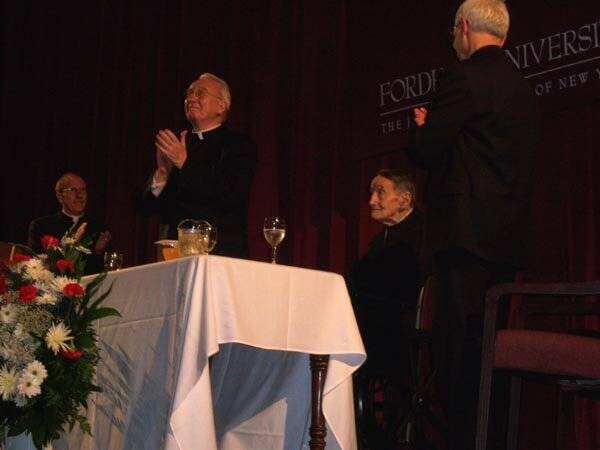Wednesday night at the Fordham University Chapel, Father Joseph O’Hare--former Fordham president, associate editor at America and longtime friend and colleague of Avery Cardinal Dulles--delivered the homily at the Mass of the Holy Eucharist in honor of the late cardinal. Here are his remarks:
Luke’s narrative of the two disciples walking on the road to Emmaus is a story that retains, despite its familiarity, the ability to set off in our spirits a sense of wonder and expectancy. Each of us, believer and non-believer alike, is engaged in a personal pilgrimage through life; our sense of the road ahead can seem at times confused and uncertain. But who will we meet on the journey? Will our hearts at some point be "burning within us," as they were for those two disciples?This evening we celebrate the extraordinary personal pilgrimage of Avery Cardinal Dulles of the Society of Jesus, a prince of the Church and a citizen of the academy. Through his extraordinary gifts of insight and expression, he has left us a guide to his own personal pilgrimage that can enlighten the search of others, whether they be men and women of faith, seeking understanding, or citizens of the academy, where understanding is often searching for faith.
In his account of his own search for faith, A Testimonial to Grace, written in 1944, while he waited for orders to join the United States Naval Forces in the Mediterranean, Avery Dulles set down in writing what he described as "a record, if only for myself, of the mental processes that had led me to join the Catholic Church in the fall of 1940, as a first-year law student at Harvard." Nearly 60 years later, in February 2001 during the Consistory in which Avery Dulles, a theologian but not, at his request, a bishop, was made a Cardinal of the Church, a journalist recalled that Avery had described his decision to become a Catholic as "the high point of his life." Calmly, but every so clearly, as was his way with journalists, Avery said: "I don’t believe I ever said that. I did say that the decision to become a Catholic was the best decision I ever made. But it was a beginning rather than a climax."
This evening as we celebrate that beginning and the extraordinary journey that followed, Avery Dulles, in death as so often in life, has much to teach us. In recent years, the effects of the polio he had suffered as a young man manifested themselves again, taking away his power to speak and then progressively diminished his other physical powers. Last April, when he was scheduled to give his last lecture as the holder of the Laurence J. McGinley Chair, he was not able to deliver the lecture himself and asked that I deliver it for him. When I asked him before the lecture, if I could make changes in the text, he replied in writing, "Only if they are improvements." I read the text as written, of course, but when I had finished, he wrote on a note, "Thanks for the improvements." Needless to say, I will hold on to that note.
You will recall that at the conclusion of that final McGinley lecture he commented on his own physical condition:
Suffering and diminishment are not the greatest of evils, but are normal ingredients in life, especially in old age. They are to be accepted as elements of a full human existence. Well into my ninetieth year I have been able to work productively. As I become increasingly paralyzed and unable to speak, I can identify with the many paralytics and mute persons in the Gospels, grateful for the loving and skillful care I receive and for the hope of everlasting life in Christ. If the Lord now calls me to a period of weakness, I know well that his power can be made perfect in infirmity. Blessed be the name of the Lord!
I recognize that there are many individuals who have been responsible "for the loving and skillful care" that Cardinal Dulles received in these final months but on behalf of all those who loved and learned from Avery Dulles, I cannot let this moment pass without recognizing and thanking Sister Anne-Marie Kirmse, his research associate and constant support, for the extraordinary attention to his intellectual, spiritual and physical needs that she had given for so many years.
Finally, I have often reflected on the motto Avery chose for his coat of arms when he became a Cardinal: Scio cui credidi. I know in whom I believe. Avery’s fidelity to the truth of Catholic tradition, what he believed, was rooted in his deep and confident trust in the one in whom he believed, the ultimate source of that tradition, Our Lord and Savior Jesus Christ, who now has welcomed him to everlasting life.
Joseph A. O’Hare, S.J.
Fordham University Church
December 17, 2008








